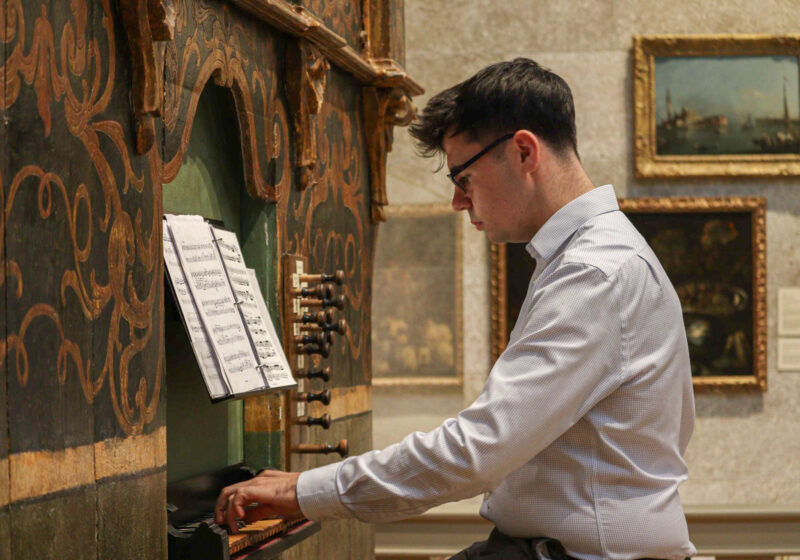Back when they were just friends, seniors Melissa Ngan and Eric Snoza used to joke that if they weren’t married by the time they were 28, they’d marry each other. Turned out they were off by a few years ? at 21, they’ve set their wedding date for June 8.
Close friends for a year and a half, Ngan and Snoza knew after a month of dating that they wanted to get married.
“It had a lot to do with being friends first,” Ngan said. “We just kind of knew. It’s hard to explain.”
In a time when the average marriage age has been consistently rising, Ngan and Snoza find themselves one of the few college couples ready to make the plunge. According to the 2000 U.S. Census, the average age of marriage is 26.8 for men and 25.0 for women. These ages declined in the first half of the century and have been steadily increasing since the 1970s.
Juniors Jessica Bunch and Matt Cuneo are another exception. They met in a math workshop last fall, went to a party together and were talking marriage three weeks later.
When asked how they knew they it was right, Bunch, 20, and Cuneo, 21, look at each, shrug and stammer.
“It’s so clich and it’s so against everything I ever believed in, but I’ve dated a lot of people and I’ve just never felt this way,” Bunch said.
“I’ve never been so happy with anyone else,” Cuneo agreed. “Every time I come over, every time I give her a hug, I’m just so excited.”
They plan to wed on May 31, 2003. Bunch never thought she would marry so young, and still says it’ll be at least six years before they have any kids.
“I imagined getting married in my first couple years out of college,” Cuneo said. “I didn’t think it would be so soon.”
Freshman Dustin Cupp met his fianc Juan Fernandez, a freshman at Nazareth College, on the Internet. Both 19, the two met in person at a friend’s house, and things went from there.
Like the other couples, Cupp and Fernandez can’t explain ? they “just knew” it was right.
“I have dated previously and I’ve never felt comfortable with anyone until I met Dusty,” Fernandez said. “There’s absolutely no doubt in my mind that he’s the one.”
A lot of people date at UR, but it’s a rare couple who decide not only that they’re ready to spend forever together, but that they’re also ready to forgo the dates and parties and drunk hookups that everyone says are supposed to be part of college.
“You can’t go home with a different person every night,” Bunch said. “You can’t live that life. But I don’t want to ? you grow out of that. It’s so nice to have someone who loves you so much to come home to.”
Ngan and Snoza, both Eastman School of Music students, also think the sacrifice is small.
“I don’t think the Eastman experience is your typical college experience. You have to be really focused,” Ngan said.
“I’m not really the type to go out to bars, so it hasn’t changed my life. I think that if being engaged seemed like a huge change from the status quo, it would mean I wasn’t really ready.”
Popping the question
Cuneo drove six hours to visit Bunch in January, right before they came back to school. They can’t agree on the story. He bought her a dozen roses and popped out the ring, he says, and then he made her dinner.
No, Bunch says, swatting him on the stomach, you made dinner first and then got the ring. She was blinded by its size, a princess-cut one-carat diamond flanked by eight side stones. Either way, both agree there were a lot of tears.
“I was just so nervous,” Cuneo said.
Ngan and Snoza sealed the official engagement over a school break as well. While he was visiting her in Virginia they went to the beautiful and treacherous Great Falls Park, where several plunge to their death each year. Against their better judgment, the two ignored the caution signs and ventured out on a flat rock to watch the rumbling falls. That’s when Snoza pulled out the ring, a large center diamond with a smaller rock on each side.
“I sat there with my mouth open for like 20 seconds,” Ngan said. “I think I kind of forgot that I was supposed to say yes. I guess that’s what happens to me when I see shiny objects.”
Cupp proposed to Fernandez on New Year’s Eve, while the two were in the car overlooking the Roanoke Valley in Virginia. On the spur of the moment, he asked if Fernandez wanted to spend the rest of his life with him. He said yes, and they both cried.
“I think it was a shock to both of us,” Cupp said. “I don’t think either of us had ever thought about marriage before.”
The two later exchanged rings. Cupp’s is a band of yellow and white gold, Fernandez’s has five diamonds in it.
Their March 14, 2003 wedding will be fairly traditional, aside from the fact that it will involve two guys. They want it to take place in church. “That way,” Cupp explains, “it’s not by law but at least it’s in the eyes of God.”
They’ll have a coed wedding party that will include best women, groomsmen and groomsmaids. Both will wear tuxedos, and they’ll walk down the aisle together.
“Neither of us will be the ‘man’ or the ‘woman,'” Cupp said. “The dresses will actually be pretty, because we’re gay. It’ll be a very stylish wedding.”
Cupp and Fernandez will probably hyphenate their names. They want to adopt a boy and a girl seven or eight years after graduation, and they’ve picked out what kind of cat and dog they’ll get.
“We’re going to have the traditional American family, just not be the traditional American family,” Cupp quipped. “We’ll be the traditional American gay family.”
Ngan and Snoza will say their vows in the garden of a historic manor home in Maryland. They’ll both stay at Eastman another year to finish their master’s degrees. Cuneo and Bunch will move to wherever he gets a job and she gets into graduate school.
For now, Cuneo lives on his fraternity floor while Bunch lives in Anderson Tower. Ngan and Snoza have been sharing an apartment downtown since August.
“Living together teaches you a lot,” Ngan said. “I think it eases the shock of the first year of marriage ? you know, learning how the other person brushes their teeth and stuff.”
Cupp and Hernandez will marry in their sophomore year and plan to live together during their last two years of college.
Married freshmen and sophomores at UR have the option of being released from their housing contracts.
“We just ask for their marriage certificates, and they’re free to go,” Director of Residential Life Logan Hazen said.
All married undergraduates are also eligible for the university’s graduate and family housing, which includes residences at Towne House, Goler House, University Park, Whipple Park and the maisonettes near the Graduate Living Center. They are given the same priority as graduate students when competing for the highly coveted housing.
“We usually only have about two couples a year doing this,” Hazen said. “We have very few married undergraduates coming here. I don’t recall any freshmen ever.”
However, freshmen and sophomores who are merely engaged cannot be released from their contracts. When he gets such requests, Hazen tells the couples to wait until junior year, when their residency requirement is over.
Weathering the storms
Not everything has been easy for these young couples. Cupp is Southern Baptist, Fernandez Catholic. Their political ideologies often conflict. Cupp says the key to their relationship is talking out their problems before they go to bed angry.
When asked if they ever fight, Bunch and Cuneo both nod vigorously.
“It’s so nice that you can fight but know you’re not just going to walk out over something trivial,” Bunch said.
Ngan agrees.
“I’m not going to say we never argue, but it’s never to the point where things are going to fall apart,” she said. “We have the same underlying opinions on a lot of things, but we really differ on other things. I think it would be weird if we didn’t fight ever.”
Most of the families have taken the news well, but Hernandez’s parents are s
till in the dark about his engagement.
“They’re very Catholic and they don’t approve of my being gay,” he said. “I’ll tell them someday, but I’m not rushing it.”
Cupp, on the other hand, says his mother has been supportive.
“She’s extremely happy that I’ve finally decided to settle down with one person,” Cupp said. “She almost treats him like a son now.”
Cuneo’s parents were surprised, to say the least. He’s the youngest of three kids, and they never expected him to be the first one. Ngan, an only child, said her parents were similarly flustered.
“They were shocked at first, but the more they got to know Eric and the kind of person he is, the more they got excited,” Ngan said. “My dad in particular was in denial for a really long time, but they totally trusted my decision.”
But the hard times have been worth it, for these six young people who have made an unusual choice. It’s painstakingly hard for them to explain why they did it ? somehow, they just know it’s what they want.
“We’re both people who have always been looking for that someone,” Ngan said. “Neither of us are really people who are scared of commitment.”





